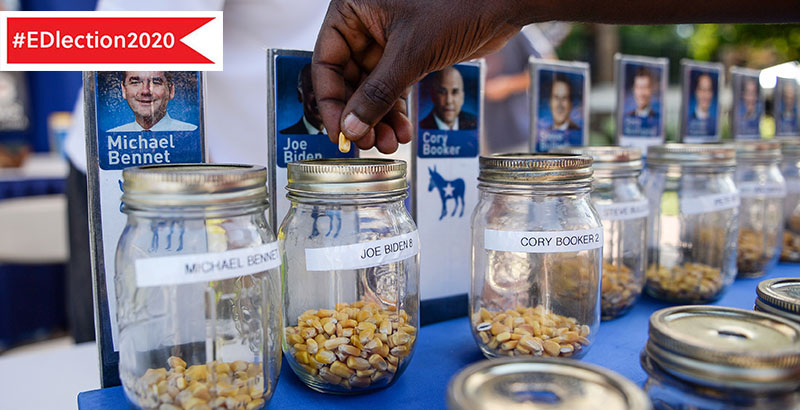Wise: Iowa’s Education Policies Are Good for Our State’s Students and a Model for the Country. Here Are 10 Reasons Why

Chad Aldeman’s recent column about the Iowa caucuses presents an unfair portrayal of the state’s educators and policymakers and paints an inaccurate picture of the state of education in Iowa. Iowa has spent years putting in place the right road map to prepare all students for success in high school and beyond, and we’re seeing results. Consider:
- Iowa has the most robust teacher leadership system in the country, and it’s getting results. More than 10,000 teachers hold formal, compensated leadership roles designed to strengthen the teaching around them, raise student achievement and offer new career pathways. In addition to spurring local increases in teacher retention and professional collaboration, the share of schools meeting their student achievement goals has grown by 8 percentage points in three years.
- Iowa leads the nation in high school graduation rate, and gaps in outcomes are closing for almost every student group. Not only has Iowa’s four-year graduation rate climbed more than 3 percentage points since 2011, graduation rates for Hispanic students have increased 8.7 points and for African-American students have risen 8.1 points.
- Iowa leads the nation in the share of high school students enrolled in college courses. More than 50,000 students enrolled in college courses while still in high school during the 2018-19 school year. Iowa is providing an entry point to postsecondary education that students in many states lack.
- Iowa is tied for the highest average ACT composite score among states that tested more than half of students in the Class of 2019. And some school districts, like Des Moines Public Schools, choose to use local discretion with state and federal funds to make the ACT available to all students.
- Iowa has a revamped accountability system focused on support, and it’s helping to improve student performance. Fewer schools were identified as “targeted” this year than last year based on better performance of the identified student groups, which demonstrates schools’ focus on improvement and equity.
In addition to missing these examples of exceptional performance, Aldeman chides Iowa for a lack of innovation. If he had looked at recently passed policies, rather than those we’ve chosen to ignore based on their weak research base and spotty track record, he would have learned:
- Iowa is expanding access to high-quality computer science instruction for all grade levels across the state. The Computer Science Professional Development Incentive Fund and the Computer Science Is Elementary Project are building capacity throughout the state to ensure that all students, especially those in low-income communities and historically underrepresented groups, have access to this new basic skill.
- Iowa has redesigned career and technical education to ensure that all Iowa students are prepared for postsecondary success. More exciting work is also just around the corner, as education and business leaders collaborate on Iowa’s plan for meeting a federal career and technical education law known as Perkins V to ensure tight linkage between the curriculum schools teach and the skills employers need.
- Iowa’s innovative Clearinghouse for Work-Based Learning is breaking new ground in forging partnerships between schools and businesses. This site connects teachers and employers to provide authentic learning opportunities for students and to ensure that access is not limited by geography.
- Future Ready Iowa is providing access to postsecondary opportunities. As just one example, more than 6,000 Iowans received over $6.8 million in awards this fall through the Last Dollar Scholarship for credentials or associate’s degrees in four key industries. Programs like this will ensure that we meet the goal of 70 percent of Iowans in the workforce with education or training beyond high school by 2025.
- The state’s new Children’s Behavioral Health System State Board is addressing the mental health crisis our schools and communities face. As part of comprehensive legislation passed last spring, the board is working to ensure better access to the services and supports students need for both academic success and social-emotional well-being.
Iowans will not rest until we improve student learning and close the opportunity and achievement gaps that exist in the state. I have visited more than 500 schools in nearly 240 districts over the past five years, and in every one of those I have observed educators working relentlessly to meet the needs of their students and families. I hope Mr. Aldeman will visit his home state to see for himself the progress we’re making.
Ryan Wise is director of the Iowa Department of Education and a former Teach for America corps member.
Get stories like these delivered straight to your inbox. Sign up for The 74 Newsletter

;)